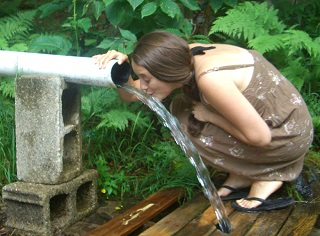From Guest Blogger Lillian Connors: The Essentials of Organic Garden Protection

Luckily, there are plenty of smart, economic and eco-friendly solutions you can introduce into your organic garden to protect it against critters and pests ‒ here is what you need to do.
Build fences
If you haven’t fenced your garden yet, then the time is perfect to finally undertake this project. While it is understandable that you want to be as close to nature as possible, if you have a garden, you simply cannot afford to let curious (and hungry) deer trample all over it and munch away at your finest salads and other tasty treats.
Be wary though, deer can jump very high, so along with its dense and sturdy base, the fence should be at least 2 metres high in order to prevent the cute critters from ravaging your precious garden. You might not be able to live out your fantasy of nurturing woodland animals from your back porch, but at least your garden will be safe.
Introduce barn owls
Barn owls are an excellent natural vermin repellent. Most people who own a garden don’t consider the possibility of raising and caring for owls and resort to artificial repellents that harm their precious plants. You can attract these gorgeous and useful creatures to make a home in your garden by building owl nesting boxes that are waterproof and well ventilated. The opening of the nest should be no bigger than 15 centimetres, otherwise your barn owls might come under attack from great horned owls.
Keep the boxes spacious and comfy in order for the female to lay more eggs and entice the owl couple to make it their home. While the owlets are still developing, the papa owl will catch and feed the pesky vermin from your garden to his children ‒ it’s a win-win!
Raise the beds
Rabbits, gophers, mice and other critters all love to feast on your precious plants, and if a rabbit doesn’t destroy your carrot bed completely, you can be sure that a gopher will. A simple and effective solution to keep all of these critters from gnawing away on your vegetables is to raise their beds. Make sure that the sides of the beds are at least 45 centimetres high in order to prevent rabbits from jumping in and underground critters from eating away at the roots.
Increase your security
No need to put up a laser web that will alert the guard dogs and the navy, you just need to set up sturdy locks. Your garden should have ample security measures not only to keep the critters away but also to discourage any potential thieves from entering your garden. In case you haven’t put up a solid lock system in your garden yet, or need to upgrade your locks, genuine professionals, as the guys at this Surry Hills locksmith service, can quickly repair, improve and replace any locks you might need, allowing you to resume your gardening operation undisturbed.
Additionally, be sure that your auxiliary garden entrances are sturdy enough to withstand any critter attack and that they won’t be able to dig their way into your garden or crawl underneath the fence door.
Build a hawk perch
Another amazing solution is to build hawk perches around the premises in order to entice the magnificent creatures to make your garden their home and nesting place. Hawks provide excellent daytime protection against rodents, and the simplest way to attract them is to build several 7-metre-tall perches that will encourage them to hunt and watch over your garden.
Be wary though, as hawks and barn owls cannot live in harmony with each other if there is not enough food to go around, so choosing to raise one of the two species will be a wise choice.
As you can see, different pests can pose a great threat to your organic garden, but by introducing these eco-friendly solutions, you will have no problems protecting your precious plants and reaping the numerous benefits of sustainable, organic gardening.
